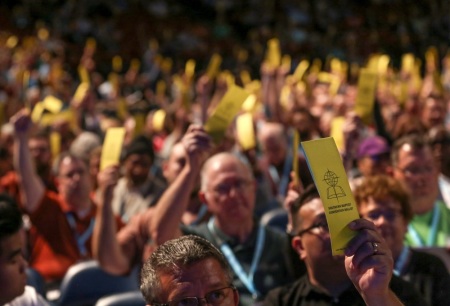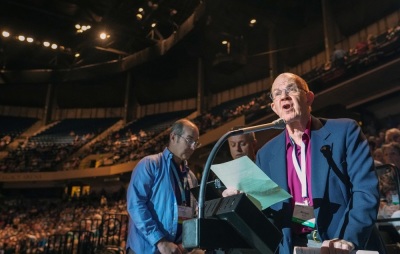SBC messengers vote to expel churches over racial discrimination, mishandling sexual abuse

Messengers at the Southern Baptist Convention overwhelmingly voted on Tuesday to expel churches accused of racial discrimination and mishandling cases of sexual abuse.
On the opening day of the largest protestant denomination’s annual meeting, held June 11-12 in Birmingham, Alabama, messengers — the delegates selected from autonomous member churches to attend the meeting — cast their votes in favor of amendments to the SBC’s constitution to state that discrimination based on ethnicity and instances of sexual abuse would put a church’s membership in peril, deeming it to be “not in friendly cooperation” with the convention.
Messengers also voted to amend the SBC's bylaws to give the SBC's Credentials Committee the power to investigate complaints against churches in instances of sexual abuse or racism and make recommendations for action.
After the votes, Ronnie Floyd, president of the SBC’s Executive Committee, told messengers, "I believe this is a very significant moment in the history of the Southern Baptist Convention. And I believe that every one of us needs to thank God for this moment,” the Baptist Press reported.
"May this world know that the Southern Baptist Convention stands against all forms of sexual abuse," Floyd said. "May this world know that this convention of churches — 47,000 churches, plus a few thousand congregations, just under 52,000 churches and congregations — has given a clear signal not only about what we believe about sexual abuse, but we also stand against all ethnic discrimination in the United States and around the world."
“The Credentials Committee will consist of nine members: the chairman of the Executive Committee; the SBC registration secretary; three members nominated by the Executive Committee; and four members nominated by the SBC Committee on Nominations,” the Baptist Press reported.
The SBC might also address the statute of limitations laws in abuse cases during this week’s annual meeting, according to The Houston Chronicle.

SBC President J.D. Greear said in May that he believes “the SBC needs a clearer process for responding to abuse, as well as qualified individuals speaking into the process who ensure that we are a convention of churches who adhere to the legal standards of reporting abuse.”
Following Tuesday night’s vote, Trilla Newbell, director of Community Outreach for the Ethics & Religious Liberty Commission for the Southern Baptist Convention, wrote on Twitter: “Last night a woman ran up to me and said, ‘I want to hug you.’ She went on to say, ‘10 years ago, at the age of 14, I came to the SBC as a victim. I was being abused by my pastor/father. Today, I'm coming as a victor.’ I'll never forget her face and her remarkable joy.”
Celebrating the vote in favor of the amendment against racism, Pastor Garrett Kell of Del Ray Baptist in Alexandria, Virginia, sent out a tweet, saying, “An amendment of SBC’s bylaws adopted today by the SBC messengers would rule out of friendly cooperation the very churches who started the convention in 1845 because of their racist stance on slavery. I’m encouraged by that progress.”
Albert Mohler, president of Southern Seminary in Louisville, Kentucky, said of the amendments: “This is the most important business to be undertaken by #SBC19, and it is really important that this motion pass overwhelmingly. It’s an important start. In this age, the SBC needs a standing credentials committee.”
With the repurposing of the Credentials Committee, changes to the bylaws included the creation of a Registration Committee which will manage the duties previously undertaken by the former Credentials Committee, such as the messenger registration process, the Baptist Press reported.
"If it's not working the right way in our minds, we can always change it," Floyd said. "But thank God we have today, once again, sent a clear signal, a concrete statement, that it's not only about what we say, but it's about what we do" in calling Southern Baptist churches to be "faithful to the things of God and to the ways we treat one another."
"And to God be the glory for what He has done this day," he added.





















